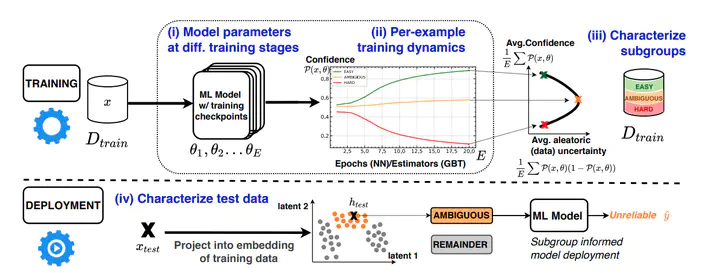 Data-IQ Framework
Data-IQ Framework
Abstract
High model performance, on average, can hide that models may systematically underperform on subgroups of the data. We consider the tabular setting, which surfaces the unique issue of outcome heterogeneity - this is prevalent in areas such as healthcare, where patients with similar features can have different outcomes, thus making reliable predictions challenging. To tackle this, we propose Data-IQ, a framework to systematically stratify examples into subgroups with respect to their outcomes. We do this by analyzing the behavior of individual examples during training, based on their predictive confidence and, importantly, the aleatoric (data) uncertainty. Capturing the aleatoric uncertainty permits a principled characterization and then subsequent stratification of data examples into three distinct subgroups (Easy, Ambiguous, Hard). We experimentally demonstrate the benefits of Data-IQ on four real-world medical datasets. We show that Data-IQ characterization of examples is most robust to variation across similarly performant (yet different models), compared to baselines. Since Data-IQ can be used with any ML model (including neural networks, gradient boosting etc.), this property ensures consistency of data characterization, while allowing flexible model selection. Taking this a step further, we demonstrate that the subgroups enable us to construct new approaches to both feature acquisition and dataset selection. Furthermore, we highlight how the subgroups can inform reliable model usage, noting the significant impact of the Ambiguous subgroup on model generalization.